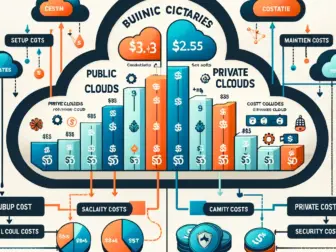Tag - private cloud iot
Unlocking the Potential of IoT with Tailored Security: The Rise of Private Cloud Solutions
Unlocking the Potential of IoT with Tailored Security: The Rise of Private Cloud Solutions
The Internet of Things (IoT) has transformed the way we interact with the world, connecting everyday objects to the internet and enabling them to collect and exchange data. However, as the number of connected devices continues to soar, the need for secure and scalable data management solutions becomes crucial. This is where private cloud IoT comes into play, offering a blend of the IoT’s versatility with the security and control of a private cloud infrastructure.
Private cloud IoT refers to a dedicated cloud environment that is exclusively used by a single organization. Unlike public clouds, which are shared by multiple tenants, private clouds offer enhanced security, as they are typically hosted on-premises or through a private data center managed by the organization or a third-party service provider. In an IoT context, a private cloud enables companies to manage a vast array of connected devices and the massive amounts of data they generate within a secure, controlled environment.
One of the principal advantages of private cloud IoT is the level of security it offers. With IoT devices often being vulnerable to cyberattacks, a private cloud can provide robust security measures, including firewalls, intrusion detection systems, and encryption to protect sensitive data. Moreover, because a private cloud is managed by the organization itself, it allows for stricter access controls and monitoring of data flows, ensuring that only authorized personnel can access the IoT ecosystem.
Another significant benefit of private cloud IoT is the ability to customize the infrastructure according to specific business needs. Organizations can tailor their private cloud environment to support the unique requirements of their IoT applications, whether it’s adjusting storage capacity, computing power, or network configurations. This customization leads to improved performance and efficiency of IoT applications, as the infrastructure is optimized for the specific tasks at hand.
Private cloud IoT also provides better control over compliance and data sovereignty issues. For industries that are subject to strict regulatory requirements, such as healthcare or finance, a private cloud can ensure that data is stored and processed in accordance with relevant laws and standards. This is particularly important when dealing with sensitive information that cannot be risked being compromised or accidentally shared on a public cloud.
Scalability is another aspect where private cloud IoT shines. Although public clouds offer virtually unlimited scalability, they may not always meet the specific scalability needs of IoT applications. Private clouds can be scaled up or down with more precision, enabling organizations to add more storage or processing power as their IoT networks grow, without paying for unnecessary resources.
Despite these numerous advantages, private cloud IoT comes with its own set of challenges. The upfront investment for setting up a private cloud infrastructure can be significant, and organizations need to have the expertise to manage and maintain it. Additionally, while scalability is more controllable, it may not be as rapid as with public cloud services.
In conclusion, private cloud IoT merges the innovative capabilities of IoT with the security and control of private cloud computing. It provides organizations with a secure, customizable, and compliant environment to manage their IoT devices and data. As businesses continue to explore the potential of IoT, the adoption of private cloud solutions is likely to grow, offering a balanced approach to harnessing the power of connected devices while maintaining data integrity and security.
